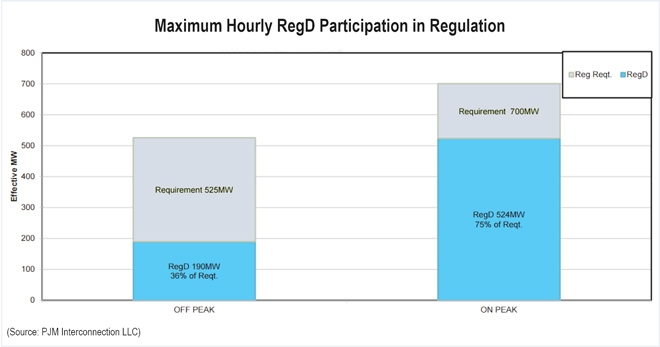VALLEY FORGE, Pa. — PJM staff introduced a problem statement at last week’s Operating Committee meeting to address concerns that the RTO is purchasing too much fast-responding “RegD” resources, which is negatively affecting regulation and reliability.
The problem statement calls for a reevaluation of the marginal benefits factor used in the regulation market optimization solution, which appears to over-value the contribution of RegD resources as a substitute for traditional RegA.
“In order for the regulation market to arrange the optimal, least-cost combination of RegA and RegD to meet [area control error] control requirements, the marginal benefits factor function needs to be accurately defined,” according to the problem statement. (See PJM Market Monitor: Faulty Marginal Benefit Factor Harming Regulation.)
Generators’ Non-Compliance Continues
PJM staff continues to struggle with generators’ non-compliance with training and certification requirements.
While transmission owners generally are in compliance, 10 generators (12%) were non-compliant for certification, and two (3%) were non-compliant for training as of May, PJM’s Glen Boyle told the Operating Committee. Four demand response companies (17%) were non-compliant for training. In addition, four small generation companies (20%) were non-compliant for training.
While non-compliant companies are supposed to submit mitigation plans, many have not, and there are no financial penalties for failing to do so.
Stakeholders suggested PJM identify a compliance officer at each organization with whom to follow up. (See PJM Operating Committee Briefs, “Sought: Ways to Incent Training, Certification Compliance.”)
SPS Removals in PPL
PPL Electric Utilities is removing three special protections schemes (SPS).
- Susquehanna Loss of Outlet Scheme: The SPS would trip Susquehanna Unit 2 when two 500-kV outlets were open at the same time. The SPS is no longer needed with the May addition of the Susquehanna-Roseland 500-kV line.
- Wescosville T3 SPS: The Wescosville 500/138-kV Transformer T3 would trip when the Alburtis end of the Susquehanna–Wescosville-Alburtis 500-kV line was open. The SPS is no longer needed with the May installation of the Breinigsville 500/138/69-kV substation.
- Montour Runback SPS: During construction of the 230-kV line between Lackawanna and Bushkill and on one of the two Susquehanna-Harwood 230-kV lines, certain contingencies could overload the remaining second line. This SPS either reduced the output of Montour Units 1 and 2 or tripped the units to alleviate the overload. The SPS is no longer needed with the rebuilt line between Lackawanna and Bushkill and the Susquehanna-Harwood lines being back in service. It is blocked and will be removed in September.
— Suzanne Herel



